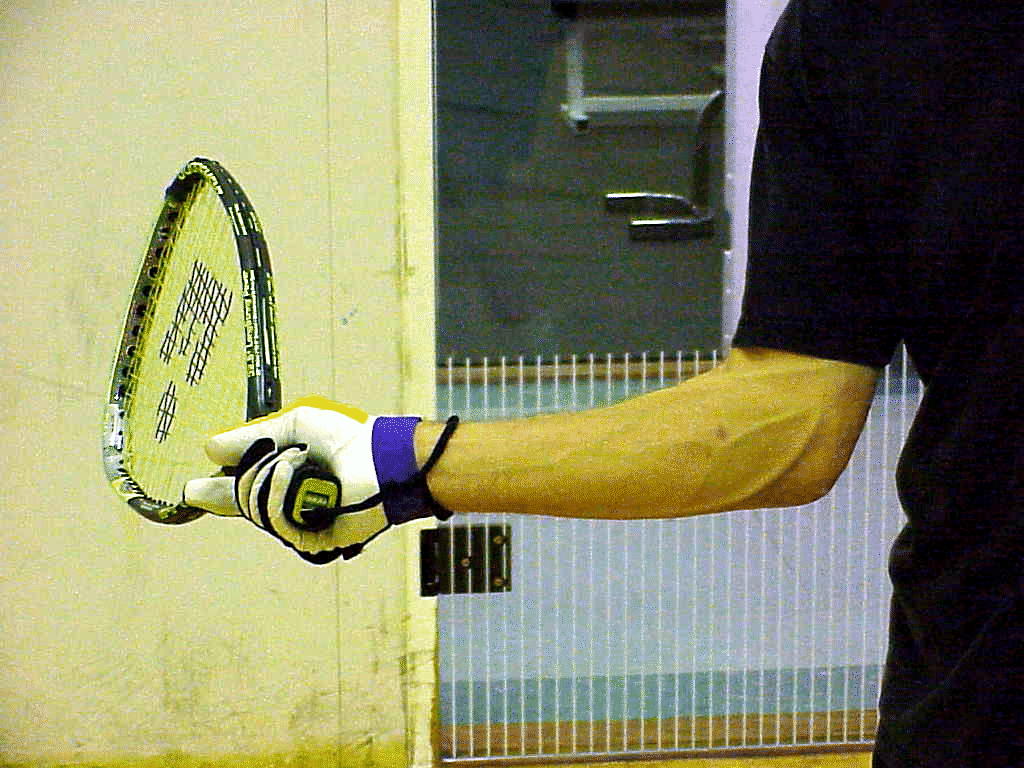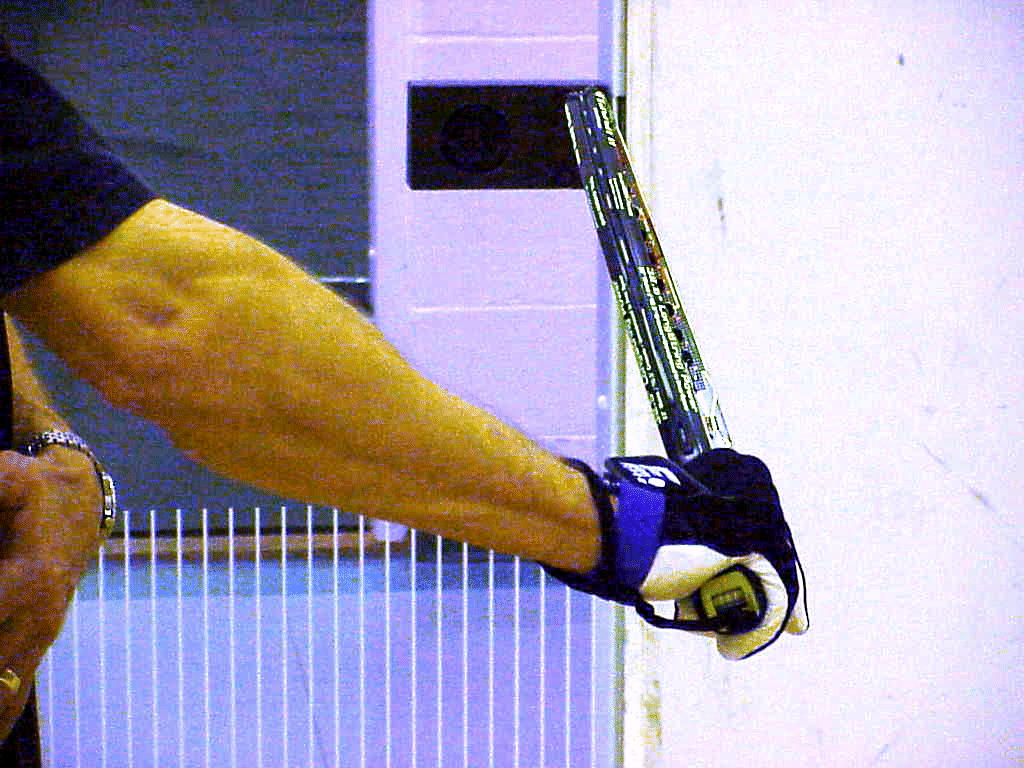The touch game
Unlike the
situation in squash, you can be a very successful racquetball player
without ever hitting a drop shot. In squash, you are not allowed to hit
the bottom18 inches of the front wall, so rollouts are impossible. One
of the few ways to hit a kill shot is to hit a soft shot that floats to
the front wall, just above the 18 inch line and then dies in the front
court. So squash players tend to be good touch players. In racquetball,
you are encouraged to hit the bottom of the front wall and, at least
for many players, it is easier to hit low on the front wall with a hard
shot than it is with a floater. On the other hand, some players are
natural dinkers. If you are one of them, you don’t need to read this.
So, assuming you
are not a natural drop shot artist, why would you want to learn how? I
can think of only two reasons: (1) it is a gentle stroke that is easy
on your body and (2) it’s fun.
When to hit a drop shot
There are many situations that could call for a drop shot. The
first is essentially the same situation that calls for any rally-ending
shot, namely, you are within 30 feet of the front wall and your
opponent is behind you. At this point the usual recommendation depends
on the height of the ball. If the ball is between waist and knee, hit a
pass; if the ball is below your knee, hit a kill shot (pass-kill,
pinch, reverse pinch, or splat). If you add a drop shot to your
repertoire, you can hit a drop shot (which is a kill shot because it
bounces twice before the short line) from between your waist and knee
where you would normally hit a passing shot. This could end the rally
immediately. Of course, if the ball is below your knee, or you move so
that the ball drops below your knee, you can hit any shot, including a
drop shot.
Another situation
that is a natural for a drop shot is when the ball hits so far up on
the front wall that it flies directly to the back wall and to within a
few feet of the front wall without bouncing on the floor. Run up to the
front court, close to the front wall. keeping eye on ball. Let the ball
drop as low as you comfortably can (well below your knee) and then
simply push it into the front wall for the down the line or into the
corner for a soft pinch. (You can also blast the ball if you don’t want
to dink it. You can also fake a blast and then dink or fake a dink and
then blast it. You choose.)
If you are extremely confident, it is fun to hit drop shots anytime
from anywhere. However, they are low percentage shots from the back
court. (If you miss and hit it short, you skip; if you miss and leave
it up you give your opponent a plum setup. In either case, you've lost
that rally.)
How to hit a drop shot from the back court
To hit the drop shot from a setup, I recommend the following technique.
Start from a modified ready position. Instead of bringing the elbow up
to shoulder height, bring the racquet back as if you have already
started your stroke with the butt of the racquet pointed toward your
target and your elbow close to your body. Your racquet should be at
about a 35 degree angle (somewhat flatter than in the following
pictures (which are from the stroke
tutorial).


Push the butt of the racquet past the ball, so that the ball
contacts the strings at the sweet spot of the racquet. Don’t snap your
wrist. Keep eye on ball. The target is about a foot up on the front
wall. The ball will have some backspin, which helps it die quickly.
Follow through gently. The only way to learn this shot is to practice.
Start around the dotted line. Drop and hit a drop shot. After you get
skillful from this point, you can move back and try from deeper court.
Drill
A drill for this
situation is to simply hit the ball into the front
wall 12 feet high or higher from center court so that it flies directly
to the back wall without bouncing and then rebounds and drops close to
the front wall. Start running as soon as you see that the ball will fly
off the back wall. You don't want to arrive too late. Practice waiting
patiently for the ball to drop before pushing it low into the front
wall or corner. You should also practice blasting it, because if you
always dink it, your opponent will eventually learn to charge the front
wall and may re-kill it. If the ball is going to hit the front wall
before bouncing (very rare but it can happen), then wait for it to
rebound off the front wall and then kill it.
[What should you
do if you hit this stupid shot and the ball is in the front court about
to be dinked by your opponent? Answer: Stay back most of the
time. Make your opponent kill the ball. Don't let her get away with an
easy pass. Charge the front wall occasionally, so that you are not
predictable, but stay back more often. Remember, it would be a miracle
if you don't lose this rally, so save your energy.]
Drop shots from center court
I once took a
lesson from a squash pro. He said that if anyone hit the ball to him
when he was at the T (good center court position on a squash court) he
always killed the ball with a gentle front wall to side wall nick that
would crack out. He had practiced this shot so often that he virtually
never missed. This sounded like a great idea. Remember, if you are in
good center court position, you should try to stay there. Don't give up
this prime real estate unless you absolutely have to. Just because the
ball is likely to come off the back wall doesn't mean you should go
back there to wait for the setup. You are letting your opponent have
the best place on the court.
So, if you are in
good center court position and the ball comes to you
anywhere between chest and knee, volley it. Assume that you are in the
ready position with the racquet held horizontally across your body.
Punch the ball with the racquet strings pointing toward the
intended
target using a jabbing motion. Your target is usually one of the
corners. If the ball is below
your waist, and you have time, you can often hit a drop shot using the
drop shot stroke technique outlined above. If you are jammed, so that
the ball is right at your feet, you can drop the head of the racquet so
that it is almost perpendicular to the floor and give it a little wrist
snap to get the ball to hit low on the front wall.
Desperation drop shot
Suppose
the ball is just about to die in the front court or mid-court and you
are running like mad just to get your racquet on it. In this situation,
run with the racquet in front of you, face up at a 35 degree angle, so
when you do finally arrive, you can slip the racquet under the ball.
Your momentum from running plus the upward lift provided by the open
racquet is frequently enough to get the ball to the front wall, where
it dies. If you have time, you can flick it upwards to generate a
ceiling ball or reverse ceiling ball.
More drills
A good drill to practice the touch game is to stand on the foot fault
line in the middle of the court and rally with yourself, hitting only
dink shots. Try to get the ball to bounce straight back so that
it
doesn't get past you. Hit 10 good dink shots that hit low on the front
wall. Now move back to the short line and repeat the exercise. Try not
to let the ball get by you. Finally, move to the dotted line and
repeat. Now the goal is to get the ball to bounce twice before the
short line for a kill. This drill teaches you how the drop shot feels
on the racquet. It also trains your muscles to hit the shot with the
right amount of "touch."
Another good drill is to
stand
in good center court position, two feet behind the dotted line, and hit
low, hard shots directly back at yourself. Rally with yourself, trying
to kill the ball with drop shots. You will find that your shots are
better the longer you keep your eye on the ball, so this is a good
exercise to practice keeping eye on ball. Practice punching the ball
into the front wall or corner if you are jammed and hitting the nice
drop shot with the stroke mechanics outlined above when you have time.
Again, the goal is to hit a winner while not letting the ball go by.
(Later on you will want to become less predictable in this position.
Mix in some ceiling balls, hard passes, pinches, etc. with your drop
shots so your muscles don't do the same thing every time. See the
section on court positioning.) For
a short video showing a variety of drop shot techniques, click here.
Home



